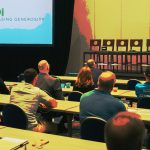Lessons from The 7 Habits of Highly Effective People
For years I have loved the book The 7 Habits of Highly Effective People by Stephen R. Covey. I even attended training on this topic, which included valuable lessons that can be applied to nonprofit work in 2025.
We are living in an increasingly digital world, where authentic connections are more important than ever. That’s true for organizations as they connect with their donors, volunteers and other supporters – and it’s also true for nonprofit leaders connecting with their staff and community.
So while the training prompted deep personal reflection, it also reminded me so much of BDI’s nonprofit client partners, especially those at the helm of their causes. Many of these nonprofit leaders are highly effective at the work they do and live by these “habits” whether consciously or not.
The training I attended focused on 7 habits, based on unchanging principles, that mirror personal growth, effectiveness and authenticity:
- Habits 1-3 are considered private victories (personal)
- Habits 4-6 are public victories (learning to work together with others)
- The 7th habit, “sharpening the saw,” makes all the other habits possible
Read on as I share 3 lessons from this session, along with actionable exercises, that can make you an even more effective and trusted leader at your organization.
1. Start, Stop, Continue*: A Simple Feedback Exercise
Before the training began, I sent out a set questionnaire to my colleagues to gauge areas to work on. It was a humbling, but helpful, experience and one that I would recommend.
Exercise: Send out the following “Start, Stop, Continue” exercise to a cross section of your nonprofit colleagues.
Simply say: “I’m seeking to learn and grow in my role and would value your input. What are some things that you would like me to start doing, stop doing and continue doing?”
Listen bravely. Pay particular attention to any patterns in the feedback.
*“Start, Stop, Continue” courtesy of 7 Habits teacher Ron Reich
2. Begin with the End in Mind: Defining Your Leadership Legacy
“If you were to ask me what single practice would do more to balance your life and increase your productivity than any other, it would be this: plan your week each week before the week begins.” -Stephen R. Covey, author of The 7 Habits of Highly Effective People.
A noteworthy exercise in 7 Habits is to imagine your own funeral and to envision what the key people in your life (spouse, children, family, friends, colleagues, etc.) would say during the eulogy.
This exercise is powerful because it allows us to glimpse how we want to be known and remembered. The concept being: once you establish what is most important, prioritize actions that support this value.
The notion is to “begin with the end in mind.” Consider how “all things are created twice: first by creating a blueprint and then by living the plan.”
Exercise: Take some quiet time alone and imagine that you are at your own retirement party, years from now. You are surrounded by your colleagues and those that you served at your nonprofit. What would you hope that they are saying about you and your career at your nonprofit?
Develop these thoughts into a personal mission statement to help guide you.
3. Seek First to Understand, Then to Be Understood: Practicing Empathetic Listening
One personal takeaway that stood out from this training was a practice called “empathetic listening: authentically seeking to understand, then rephrasing the content and reflecting the feeling.”
This technique is particularly suited for high-emotion conversations, or even in business settings where you seek to build trust. (Learn even more about empathy and other qualities of effective leadership in this BDI article.)
The simplest form of empathetic listening is to, in the heat of the moment, repeat back word-for-word what is being said to you. More advanced practice involves translating what is being said back to the person, reflecting feelings and words.
When I came home after the training, my young son started to have a meltdown involving his Legos. I practiced empathetic listening: I quietly repeated back to him what he was saying, without judgment or trying to solve the problem.
I was seriously amazed as he began slowly calming down. It was an unexpected connection.
Exercise: When you find yourself in a high-emotion conversation at your nonprofit, practice first repeating back word-for-word, without judgment or trying to solve the problem.
Keep practicing.
If these exercises have been helpful, continue your journey by joining me in reading and applying The 7 Habits of Highly Effective People!
Stay updated on what’s next for nonprofit fundraising!
Sign up for our newsletter today to get the fuel that will help boost your fundraising for nonprofits to the next level.





